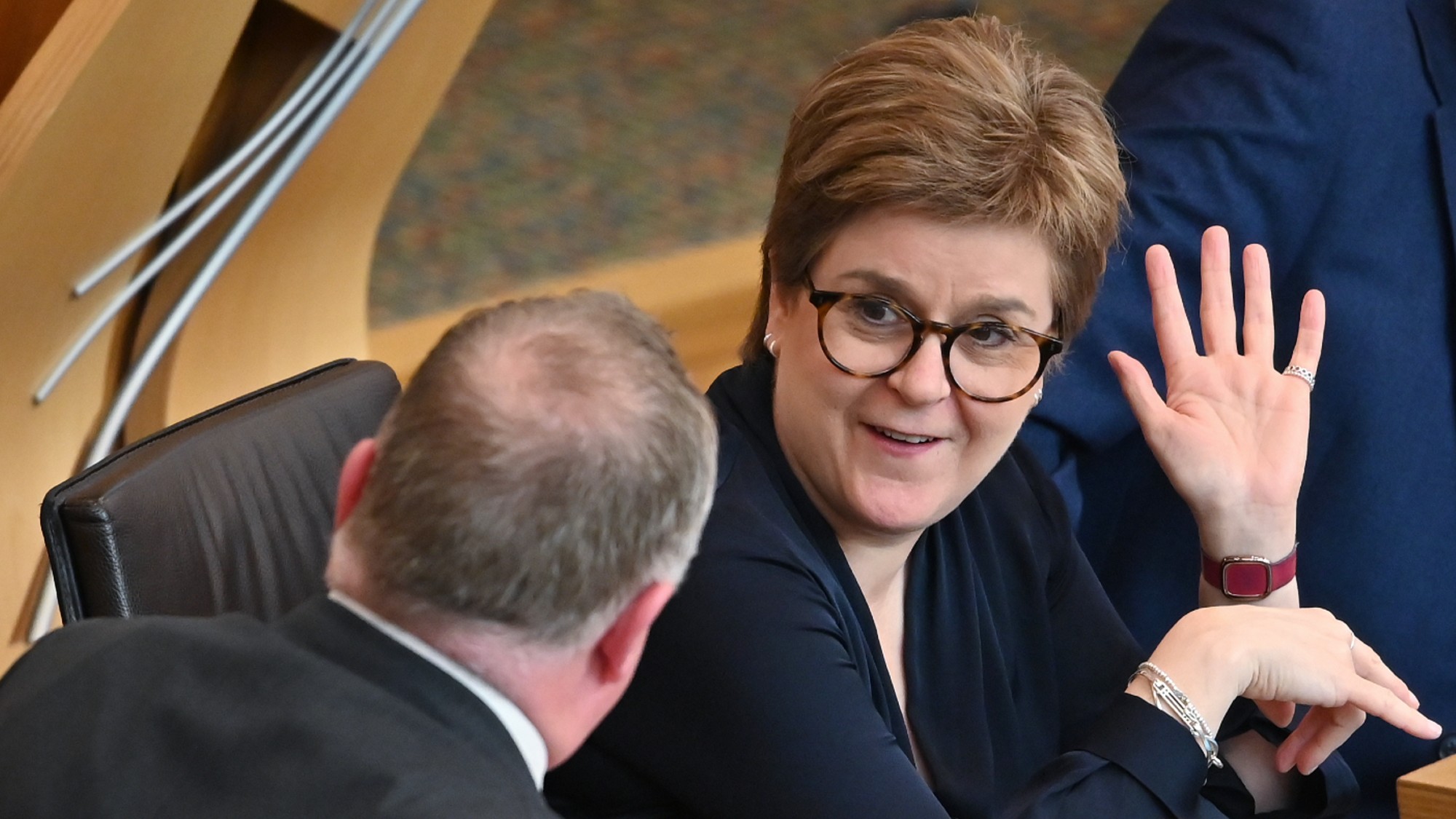Five reasons why Tories have their backs to the wall
Despite one encouraging poll, Cameron launches his campaign with the numbers refusing to add up

A free daily email with the biggest news stories of the day – and the best features from TheWeek.com
You are now subscribed
Your newsletter sign-up was successful
Did the first TV confrontation of the campaign - the grillings of David Cameron and Ed Miliband by Jeremy Paxman and a public audience - change the course of this election?
Yes it did, said the Sunday Times. ‘Labour races into four-point lead after Miliband’s TV success’ was the paper’s headline as its weekly YouGov poll showed Labour jumping to a 36-32 lead over the Tories.
But then along came a ComRes poll for the Mail last night with the exact opposite outcome – a four-point Tory lead. This, said the Mail, showed the Conservatives moving into “their strongest position for five years”.
The Week
Escape your echo chamber. Get the facts behind the news, plus analysis from multiple perspectives.

Sign up for The Week's Free Newsletters
From our morning news briefing to a weekly Good News Newsletter, get the best of The Week delivered directly to your inbox.
From our morning news briefing to a weekly Good News Newsletter, get the best of The Week delivered directly to your inbox.
YouGov: Con 32 (down 4), Lab 36 (up 2), Lib Dems 8 (up 1), Ukip 13 (u/c), Greens 6 (down 1).
ComRes: Con 36 (up 1), Lab 32 (down 3), Lib Dems 9 (up 1), Ukip 12 (up 2), Greens 5 (down 1).
Two new polls today from Populus and Ashcroft will hopefully tell us whether either YouGov or ComRes have picked up on an emerging trend or whether we are back to the good old neck-and-neck metaphor.
It’s worth looking at the contrast between what a four-point lead means for Cameron and Miliband.
A free daily email with the biggest news stories of the day – and the best features from TheWeek.com
Peter Kellner of YouGov spelt out the dramatic implications of his poll’s four-point Labour lead. It meant a six per cent swing from Conservative to Labour across England and Wales. “Labour would gain enough seats to come close to an outright majority, even if it lost badly in Scotland,” said Kellner.
He estimated that Labour would have 314 MPs to the Tories’ 251 with the Scottish Nationalists on 48 and the Lib Dems on 17. With 326 seats needed for a Commons majority, these figures would make a Lab-Lib Dem coalition feasible - and reliance on SNP support unnecessary.
But how would a four-point Tory lead work? Put the ComRes numbers into the Electoral Calculus predictor and you get the Tories winning 301 seats - 25 short of an overall majority. With EC predicting the Lib Dems winning just 11 seats, a second Tory-Lib Dem coalition doesn’t add up. (Nor does a Lab-SNP pact: Labour would have 273 and the SNP 44 seats, total 317.)
So, the Tories go into their campaign launch today with their backs against the wall. Here are five reasons why:
1. Both coalition parties have lost support
The two parties that have kept Cameron in power since 2010 had the combined support of 60 per cent of electors at the last election – a total of more than 17.5 million people supported Cameron’s Tories and Nick Clegg’s Liberal Democrats.
Being in government has cost both parties support. Recent polls show the Lib Dems are down to a third of the backers they had at the last election. The Tory decline has been more gentle (down from 37 per cent to about 33 per cent) but the combined support for the coalition parties is now around 40 per cent of the electorate.
A drop from 60 to 40 per cent can mean only one thing – the coalition parties will be losing seats. (Any gains the Tories make by winning Lib Dem seats will likely be cancelled out by Labour gains from Clegg’s party.)
2. Labour support has risen since 2010
The starting point for all assessments of Cameron’s hopes of staying in power is what he achieved in 2010 – a seven-point lead over Labour (37 to 30) in terms of the vote share. You have to go back three years to March 2012 to find the Conservatives matching their 2010 vote share.
Labour support has fallen in the last year – in March 2014 they even hit 40 per cent in one poll – but with an average of 34 per cent now, they are still well up on 2010.
3. Cameron’s potential allies are not strong enough
The forecasts of 12 different academic teams are set out on the Political Betting website – and not one of them believes the combined tallies of Tory and Lib Dem MPs will add up to the magic 326 required for a Commons majority.
So what about a broader coalition? Nigel Farage has come up with the idea of a three-party pact in which Ukip and Northern Ireland’s DUP would form an alliance with the Tories. As I wrote two weeks ago, the numbers don’t add up. Under the first-past-the-post system, Ukip and the DUP will be lucky to muster 15 seats - far short of what Cameron will need, based on current polling averages.
The wildest card in the pack is the idea of a four-party deal which would also involve the Lib Dems. Nick Clegg might be willing to stomach an in-out EU referendum as the price of staying in government – but it’s far from certain he could take his party with him.
4. Tory policies don't have enough ‘switcher’ appeal
Last week’s report from the authoritative British Election Study found that Tory policies do not have a wide enough appeal to win help them win over potential ‘switchers’ from other parties.
One of the authors, Prof Will Jennings, said: "Despite the claims of the Conservatives that they offer 'competence over chaos', they do not have a clear advantage on competence with the electorate."
Co-author Prof Jane Green said that while economic recovery was an electoral asset for the Conservatives, “what isn’t known is that the Tories have much work to do if they are to convince voters that a range of key policies are working”.
5. Labour’s Scottish nightmare doesn’t help Cameron
Scotland looks like being disastrous for Labour but Cameron has nothing to gain from Miliband’s misery north of the border. Nicola Sturgeon and Alex Salmond have made it clear that however many seats they steal from Labour and gain from the Lib Dems, the new SNP MPs will stay in the Miliband column on the tally sheet in the battle to control Westminster.
Miliband is clearly uncomfortable about relying on the SNP. He still hopes and believes he can get an overall majority. YouGov suggests that’s possible. ComRes says not.
If the current tight race persists, the SNP will be kingmakers. How Miliband handles Nicola Sturgeon in Thursday’s seven-way leaders’ debate on ITV will be just as interesting as his one and only confrontation with David Cameron.
-
 The 8 best TV shows of the 1960s
The 8 best TV shows of the 1960sThe standout shows of this decade take viewers from outer space to the Wild West
-
 Microdramas are booming
Microdramas are boomingUnder the radar Scroll to watch a whole movie
-
 The Olympic timekeepers keeping the Games on track
The Olympic timekeepers keeping the Games on trackUnder the Radar Swiss watchmaking giant Omega has been at the finish line of every Olympic Games for nearly 100 years
-
 How corrupt is the UK?
How corrupt is the UK?The Explainer Decline in standards ‘risks becoming a defining feature of our political culture’ as Britain falls to lowest ever score on global index
-
 How long can Keir Starmer last as Labour leader?
How long can Keir Starmer last as Labour leader?Today's Big Question Pathway to a coup ‘still unclear’ even as potential challengers begin manoeuvring into position
-
 The high street: Britain’s next political battleground?
The high street: Britain’s next political battleground?In the Spotlight Mass closure of shops and influx of organised crime are fuelling voter anger, and offer an opening for Reform UK
-
 Is a Reform-Tory pact becoming more likely?
Is a Reform-Tory pact becoming more likely?Today’s Big Question Nigel Farage’s party is ahead in the polls but still falls well short of a Commons majority, while Conservatives are still losing MPs to Reform
-
 Taking the low road: why the SNP is still standing strong
Taking the low road: why the SNP is still standing strongTalking Point Party is on track for a fifth consecutive victory in May’s Holyrood election, despite controversies and plummeting support
-
 Nicola Sturgeon's memoir: making the personal political
Nicola Sturgeon's memoir: making the personal politicalTalking Point Former Scottish first minister attempts to set record straight in 'Frankly' but does she leave more questions than answers?
-
 What difference will the 'historic' UK-Germany treaty make?
What difference will the 'historic' UK-Germany treaty make?Today's Big Question Europe's two biggest economies sign first treaty since WWII, underscoring 'triangle alliance' with France amid growing Russian threat and US distance
-
 Is the G7 still relevant?
Is the G7 still relevant?Talking Point Donald Trump's early departure cast a shadow over this week's meeting of the world's major democracies